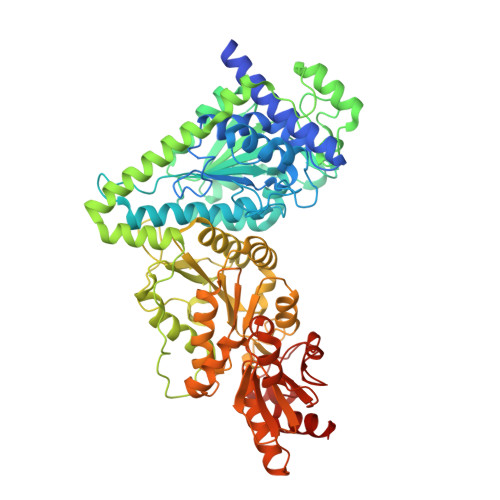Structural and biochemical characterizations of Thermus thermophilus HB8 transketolase producing a heptulose.
Yoshihara, A., Takamatsu, Y., Mochizuki, S., Yoshida, H., Masui, R., Izumori, K., Kamitori, S.(2023) Appl Microbiol Biotechnol 107: 233-245
- PubMed: 36441206
- DOI: https://doi.org/10.1007/s00253-022-12297-z
- Primary Citation of Related Structures:
7WRR, 7WRT - PubMed Abstract:
Transketolase is a key enzyme in the pentose phosphate pathway in all organisms, recognizing sugar phosphates as substrates. Transketolase with a cofactor of thiamine pyrophosphate catalyzes the transfer of a 2-carbon unit from D-xylulose-5-phosphate to D-ribose-5-phosphate (5-carbon aldose), giving D-sedoheptulose-7-phosphate (7-carbon ketose). Transketolases can also recognize non-phosphorylated monosaccharides as substrates, and catalyze the formation of non-phosphorylated 7-carbon ketose (heptulose), which has attracted pharmaceutical attention as an inhibitor of sugar metabolism. Here, we report the structural and biochemical characterizations of transketolase from Thermus thermophilus HB8 (TtTK), a well-characterized thermophilic Gram-negative bacterium. TtTK showed marked thermostability with maximum enzyme activity at 85 °C, and efficiently catalyzed the formation of heptuloses from lithium hydroxypyruvate and four aldopentoses: D-ribose, L-lyxose, L-arabinose, and D-xylose. The X-ray structure showed that TtTK tightly forms a homodimer with more interactions between subunits compared with transketolase from other organisms, contributing to its thermal stability. A modeling study based on X-ray structures suggested that D-ribose and L-lyxose could bind to the catalytic site of TtTK to form favorable hydrogen bonds with the enzyme, explaining the high conversion rates of 41% (D-ribose) and 43% (L-lyxose) to heptulose. These results demonstrate the potential of TtTK as an enzyme producing a rare sugar of heptulose. KEY POINTS: • Transketolase catalyzes the formation of a 7-carbon sugar phosphate • Structural and biochemical characterizations of thermophilic transketolase were done • The enzyme could produce non-phosphorylated 7-carbon ketoses from sugars.
Organizational Affiliation:
International Institute of Rare Sugar Research and Education, Kagawa University, Takamatsu, Kagawa, 760-8521, Japan. [email protected].

















